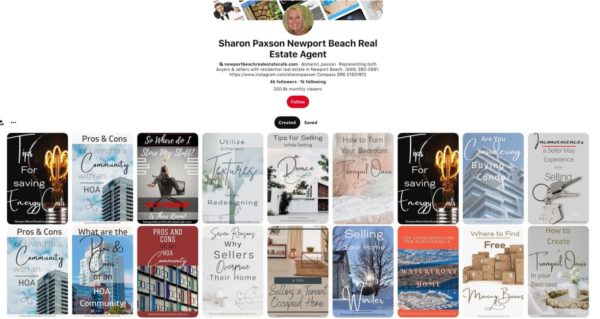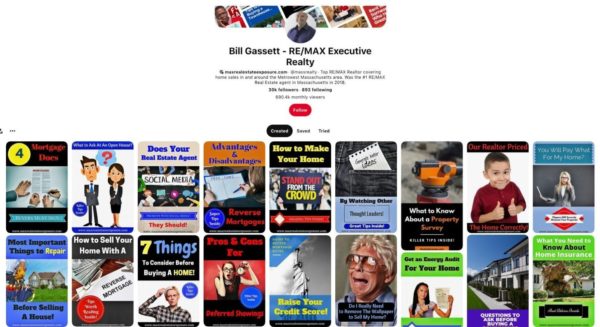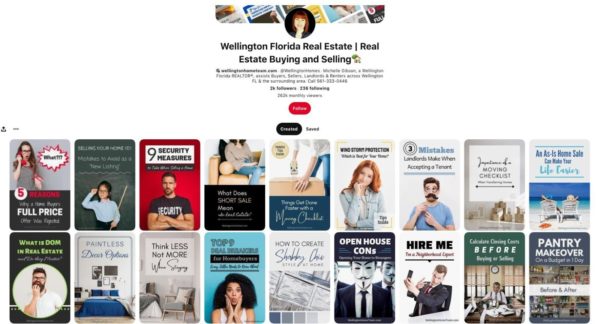
Before you cast Pinterest aside as a space for DIY crafters and amateur chefs, consider this: according to Hootsuite’s research, 90 percent of users say they use the platform to inform purchasing decisions. And this buyer base is more active than ever. Since 2019, the number of Pinterest users has jumped by 26 percent.
With that said, Pinterest is a social media platform with a twist.
Like other social media channels, using Pinterest as a marketing tool means fielding engagement. But Pinterest also acts as a visual search engine, giving you a greater ability to get your content in front of the right audience.
This aspect can generate powerful visibility for real estate agents — especially if you have a blog. That’s because, in order to get the most traction from your Pinterest real estate presence, you have to create and share unique content.

We make it easy for you to have a growing and connected client base with all the marketing tools you need, synced to the tools you’re already using.
Why Pinterest works for real estate pros
Pinterest isn’t the place you’ll advertise new listings or sales. Its ultimate goal is to help you establish your reputation as a real estate expert, building trust and relevance as a go-to real estate resource.
By posting compelling “pins” that direct users to your website, you can signal to Pinterest — and other search engines like Google — that your content is authoritative and meets searchers’ needs. This is a major component of search engine optimization.
For real estate agents, getting more leads to your website — and thereby better rankings in search results — is just one reward. An effective Pinterest strategy also helps your business to:
- Establish consistent branding in front of an active consumer market
- Develop social proof of your real estate expertise
- Move potential clients through the sales pipeline by acting as their resource guide
- Gain important market insights, like buyers’ and sellers’ most pressing concerns, questions, and interests

Pinterest real estate best practices
Like all social media platforms, Pinterest has its own set of best practices that help you reach the most screens and convert that audience to leads.
1. Define your target client
Understanding your ideal buyer or seller demographics, behaviors, and values is a must to engage them with the right pins.
The real estate process is an intimate one, so you may already have a good idea of who your target client is. Or you can distribute a survey to collect this feedback in one easy sweep.
Knowing what the competition is up to is also key — be sure to keep tabs on which of their posts seem to resonate most with your target audience. Honing in on the interest of your target demographic ensures you focus on the best-performing topics in your own content for real estate marketing.
2. Do your keyword research
Because Pinterest is a search engine, keywords optimize your content to help the platform link it to a user’s query.
This means you need to develop your keyword list around a user’s search intent — that is, what terms and phrases they are using to find answers. You can even use Pinterest’s search bar to get suggestions about what people are looking for about a topic you want to address.
To build and use a high-performing keyword list:
- Look for local, long-tail search phrases
- Analyze the value of your target and related keywords — you want a balance of lower competitiveness and greater search volume
- Include keywords in your pins’ alt-text and descriptions
- Optimize your profile
- Use keywords to write board titles and descriptions
3. Set up a business account
When you create a free Pinterest business account, you gain access to extra functionality and benefits like:
- A header with your pins to reinforce branding
- A verified website for real estate, improving your brand authority on the platform
- Analytics like impressions, engagements, clicks, and views so you see what resonates with your audience
- Access to Pinterest’s advertising options
4. Use branded visuals
Content you share on Pinterest is presented as a “pin” on users’ feeds. This pin should tease at their interest, encouraging clicks to visit your site or re-pins within their own network.
Top-performing pins:
- Use high-quality imagery that is well-lit, well-composed, and attention-grabbing
- Maintain a consistent theme with fonts, colors, and style
- Include branding, like a watermark of your logo
- Have keyword-optimized descriptions
- Describe the topic on the image itself, which you can design with tools like Canva

5. Engage frequently and consistently
Pinterest isn’t just a delivery system for your blog posts — to earn visibility, you’ve got to be social.
Consistency is key. Set a schedule for how often you will pin new content and stick to it. Start with different times of the day and use your Pinterest analytics to isolate which timeframes and days of the week attract the most activity.
For the rest of your daily Pinterest routine, ensure that you’re interacting with others’ content by commenting and re-pinning. Tools like Tailwind can help you build and manage this engagement schedule.
Real estate marketing with Pinterest
With your profile and schedule organized, you now want to get your pins in front of potential buyers and sellers. This comes down to two key components: what you say to your audience and how you say it.
6. Publish evergreen content
If you don’t already have a real estate blog, you should start. Real estate agents who consistently post new content attract more leads than those who don’t.
Maximize your blogging efforts by focusing on evergreen content — posts that maintain their topical relevance over time.
This strategy plays in Pinterest’s favor. Unlike other social media channels, the average lifespan of a pin is about a year — and it can steadily gain you more visibility over this time. In comparison, a Twitter post’s relevance dies off after about 18 minutes, while Facebook posts can survive for a few hours.
Make sure that your content survives Pinterest’s longer lifecycle. You can always edit content to reflect changes and refresh your current listings within the post — but themes and topics should be sustainable.
Your target client profile and keyword list can guide this topic selection, like:
- How-to guides related to the buying and selling process
- Up-and-coming neighborhoods in your area
- Common mistakes to avoid when buying or selling a home

To encourage more engagement, expand your content strategy to real estate-adjacent topics that appeal to your audiences’ interests like:
- Design, landscaping, DIY, or interior decorating tips
- Roundup guides of local events and activities
- The best school districts or a list of easy kids’ lunches
- Top eateries, hiking trails, or venues that make different neighborhoods unique
7. Customize your boards
Save your pins in topic-specific, keyword-optimized boards, framing each set of pins around themes that appeal to your potential buyers and sellers. Organizing your content this way improves its searchability.
This means new leads find what you have to offer, but developing easy-to-navigate information catalogs helps maintain your relationship with past clients as well.
While it may be years before this base requires your services again, continuing to provide them with useful resources enables you to keep their interest — and they’re more likely to share this content with their friends, improving your reach with new audiences.
8. Participate in group boards
Your personal boards establish your brands’ voice, but group boards help you engage and collaborate with a hyper-targeted audience. These users have announced their active interest in specific topics, making them more likely to click on and re-pin this content.
Look for group boards that fit your niche. Before joining, ensure that:
- The board is active, meaning people are pinning content frequently
- It doesn’t have too many contributors, (otherwise your content can get lost in the stream)
- It has enough followers — but keep in mind the ideal number will be different for various topics, especially if you’re engaging a smaller, local audience
- You pin your own content but share others’ too, encouraging board activity
9. Boost activity with promoted pins
Pinterest business accounts have access to the platform’s advertising tools.
While a long-term content strategy is what sustains Pinterest traffic, promoted pins put your content in front of the right users faster, which can generate instant interest that compounds over time.
But your ads’ success still relies on a clear understanding of your client persona and ability to deliver content they want to see.
Your real estate business’s virtual open house
Think of your business’s online presence as a kind of virtual open house — inviting prospects to take a look around and see if you’re a good fit for their next real estate transaction.
After all, 90 to 99 percent of millennials and baby boomers rely on internet searches when buying a home, according to the National Association of Realtors. That’s a pretty high percentage to leave out in the cold if your open house isn’t ready for viewers.
That’s why curating your online presence is crucial as an agent.
And there’s no doubt that Pinterest can help fuel your digital marketing efforts. But, for your pins to perform well, they need to integrate into a high-quality virtual presence — from building an engaging website, marketing your real estate agency through emails, to creating compelling content and collecting social reviews.
To help you stage your virtual open house, our Online Marketing Guide for Real Estate Agents will help you position yourself as both a buyers’ and sellers’ solution.




